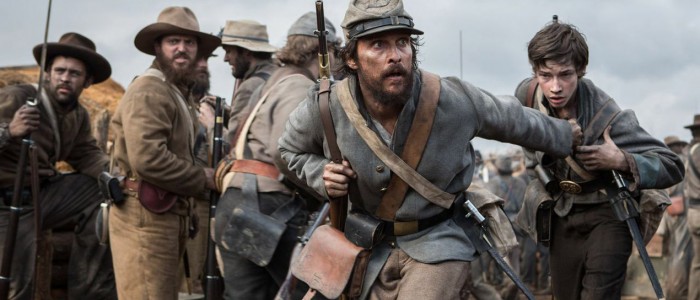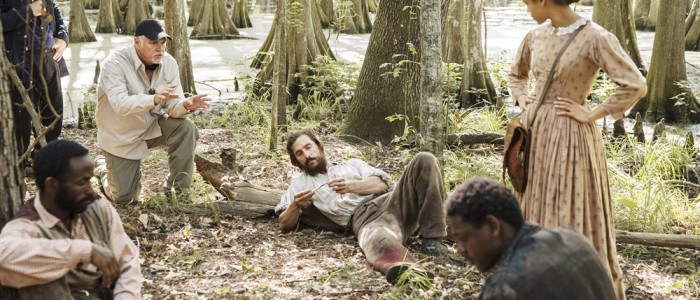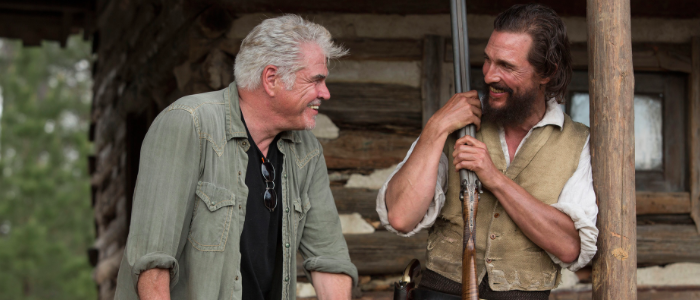Interview: Why Gary Ross Spent A Decade Working On 'Free State Of Jones'
After helping to launch The Hunger Games franchise with a $700M hit, some would assume writer-director Gary Ross wouldn't have much trouble making another film. And yet, following that box-office and critical success, Ross still struggled to get a passion project of his made. For a decade, the director behind Seabiscuit and Pleasantville worked on Free State of Jones, which has finally made its way to theaters.
Once the Civil War drama, which stars Matthew McConaughey as Newton Knight, acquired financing, Ross still found himself doing whatever he had to do to make the film, including paying a few salaries out of his pocket and working for DGA minimum. The director — who also wrote Dave and co-wrote Big – discussed his latest film and career with us. If you want to know more about Ross' upcoming Ocean's 11 spinoff, Ocean's Eight, click here.
Below, read our Gary Ross interview.
When you started off writing, did you always intend on one day directing?
I was always interested in directing. I had studied acting with Stella Adler when I was young. I had directed theater when I was young. The first movie I got made was Big. So I became a screenwriter pretty quickly. I don't know if I hadn't become a screenwriter so early if I wouldn't have probably directed actually sooner, which is a possibility.
I'd always had an eye for directing. But I see them as different jobs, you know. I love to write. I love to direct. I love to write and direct. So I don't often...although filmmaking is sort of like one thing for me, I like both aspects of it a lot.
With Pleasantville, did directing immediately come naturally to you?
It did on the sets of my other movies. I was on Big all the time. I was on Dave all the time. So I think I had a long apprenticeship. And then having studied acting with Stella Adler and having directed theater, I think that I had really prepared myself to direct. I also shot second-unit on Big. There was a lot of stuff that I had really prepared for by the time I did get a chance to direct. And also, Pleasantville was a very long prep, so I was able to prepare to shoot that as well.
Pleasantville was a movie I loved and still love. I wanted to dive into something that was cinematic and visual. If I was going to be a director, I just didn't want it to be an extension of writing. I didn't want that to be a verbal or a literary experience. I wanted it to be a visual experience as well. I think that's one of the things that drew me to directing Pleasantville first.You worked on Free State of Jones for around a decade. Were a lot of those years dedicated to research?
It was a tremendous amount of research. I don't think I did anything but read for a couple of years. And I mean scores of books. I was a visiting fellow at Harvard for a couple of years. I studied under the tutelage of a professor there named John Stauffer, who was head of the American Civilization Department. I spent a lot of time in Jones County visiting it and meeting the local people and getting the local flavor and doing kind of a visceral history.
I really had to learn a lot before I could ever write this movie. I had to learn the entire background of the Civil War. And because so much of this movie refutes the revisionism that's been around the Civil War, I had to become extra steeped in a lot of the historiography, which is the history of history, and the way the history has evolved and the way our memory of the Civil War has evolved in order to....which is a pretty new perspective in order to debunk a lot of the myths that had been promulgated about the Civil War, and especially Reconstruction.
So that's a long, long process where you are needing to master and understand a lot of material that may be outside the particular story that you are telling in order to have a supercontext.
The film focuses on Reconstruction quite a bit, and it's easy to imagine someone else finishing this story with some victorious moment after the Civil War has ended.
Well, you know, that version would have been the white savior movie. That version would have been, "Oh, there's a triumphant victory, and everything is fine," and we tie it up with a Hollywood bow and there's a happy ending. But we all know there wasn't a happy ending. No sooner was technical emancipation granted than the former Confederates got their land and their power back and began passing laws which were called The Black Codes that were a form of re-enslavement and driving people back to the plantation, driving freed men back to the plantation.
And what ensued was a 10-year struggle over the meaning of freedom, which sadly led to an abdication by the North, a quasi-victory by the South, the reinstitution of a kind of agrarian labor system that morphed into sharecropping and the birth of Jim Crow. So there's no happy ending there. And there's no false Hollywood ending there. I'd rather tell the truth than give people a false happy ending or some false satisfaction.
 "A white savior story" is definitely a trope some filmmakers avoid mentioning, so it's refreshing to hear you say it. Making sure the Free State of Jones didn't become one of those stories, is that something you had to be mindful of during the writing process?
"A white savior story" is definitely a trope some filmmakers avoid mentioning, so it's refreshing to hear you say it. Making sure the Free State of Jones didn't become one of those stories, is that something you had to be mindful of during the writing process?
If that had just been the story, I don't think I would have done it. It isn't that I avoided it in the telling of this story. I just don't think I would have wanted to do that. What made me want to tell the story was finding out about Reconstruction, finding out about a buried truth that we've lost in our history that had been rewritten, the myths that had been told.
And so, I wanted to debunk those myths and I wanted to tell the truth again, and I wanted to tell the truth finally, in a sense, about Reconstruction that had been lost. And so, I don't think I would have been drawn to a happy Hollywood trope that tied this up in a bow or the White Savior version.
No one gets saved here. [Laughs.] Let me ask you a question. Was that something you were concerned about before the movie that you felt different about after?
No, I didn't think it'd be that sort of movie, and I think going deeply into Reconstruction also shows this isn't that movie.
It's not an area most people investigate. In fact, the last movies that did it, I think, are Gone with the Wind and Birth of a Nation, both of which didn't tell the truth. And so, the chance to set the record straight is something that appealed to me.
Telling a true story, do you ever find that the responsibilities to remaining truthful while also telling a good story ever clash?
Well, of course. This has unique challenges that way. I think that you have less latitude and less leeway here in your interpretation of the facts because the Civil War and Reconstruction carries such a current meaning for people. And so, that's the reason it demanded a lot more kind of academic rigor. In fact, I'm going to be publishing a website that's footnotes to the movie.
When you were making Seabiscuit, was there more freedom to depart from the facts?
Well, there's less mystery. In other words, in Seabiscuit, the record was much more written and much more clear. Seabiscuit was famous. He was very written about. Charles Howard was easy to research. Laura Hillenbrand had written a very detailed book. I didn't have to dig in kind of the corners of rural Mississippi to find out what the truth was the way I did here.
And also, we didn't have 100 years where the truth had gotten confiscated or bent or hidden or rewritten. And so, it was uniquely challenging here, whereas in Seabiscuit it was all kind of available to you.
 Earlier you mentioned studying acting with Stella Adler. How much did that experience inform your approach to working with actors?
Earlier you mentioned studying acting with Stella Adler. How much did that experience inform your approach to working with actors?
Oh, it's everything. I'm grateful for every day that I'm on a movie set. The way that I can discuss a scene with actors and the way I can investigate a scene in a way that you don't necessarily push to play a result, but investigate process that has integrity, makes the actor a partner and pursue the various different meanings and the little corners of the tributaries or all the nuances that go into a performance. That's what acting is about. It's not just finding something that feels real. It's finding the real truth. And there are many real truths. And there's a lot of different options that you investigate in a partnership with the actor.
That's something I learned from Stella. That's something that has been very sustaining to me throughout my career. I've been lucky enough to work with some amazing actors.
How would you describe your collaboration with Mr. McConaughey?
Oh, it's wonderful. Matthew and I had almost a kind of visceral connection on this thing. First, he's a very prepared actor. He does a lot of homework. He really spends the prep preparing the character, investigating the character. Then he and I finally come together, we investigate scene by scene what the movie means, what the various choices are, and what the different possibilities are, and kind of come together.
But early on in the movie, and Matthew talks about it all the time, we did a little experiment on day four. He actually did it. He said, "All right. Take a piece of paper and look at the monitor and write down what your favorite takes are of the scene we just did." I said, "OK." It was like the first part of take four, and the second half of take eight. I wrote it down. And then we both opened them up. And he'd written the first part of take four and the second part of take eight. He always loves to tell this story.
He said from then on there was trust. I knew that this guy had my taste. We shared the same taste. Once that's established, then you are in a much more visceral thing with the actor. It's like you are playing jazz together at that point. And that comes from trust.
 Do you face a lot of difficulties trying to make movies like Free State of Jones or Seabiscuit?
Do you face a lot of difficulties trying to make movies like Free State of Jones or Seabiscuit?
Well, Free State of Jones, it was a huge difficulty getting it made. I wrote it before I did Hunger Games. I tried to get it made. I couldn't. Then I did Hunger Games thinking, "Well, if I do this movie, maybe it will give me the clout to get Free State of Jones made." So all the time I was doing Hunger Games, I had an eye for doing this. It was one of the things that very much informed my decision to leave the franchise, was that this was kind of my life's work. I'd spent years and years researching this. And so, it wasn't like it was something I could let go. It wouldn't let go of me.
And then even after I left Hunger Games I had trouble getting it made because it's a drama and we're in a different kind of a popcorn universe now, and it's not cheap. It's not wildly expensive. It's $49 million after all the rebates and everything. Nonetheless, that's not $20 million.
So it was still hard. And then Matthew did Dallas Buyer's Club and then we came together and we still had some trouble, and then we finally got the movie financed. But it was always something that never left me. Even while I was shooting Hunger Games, I'd be in the woods of Carolina and I would look at my production designer. We'd be standing at a creek and I'd say, "So, what are you thinking about?" And he goes, "Jones." He ended designing both movies. So it's something that had a hold on both of us.
I just think that some things are harder to get made than others, and that's understandable. It just means you have to work a little harder. It's no one's fault. I don't blame anyone for looking at an epic story of the Civil War and Reconstruction and they're not going to confuse that with The Avengers or a Marvel movie. That's an understandable commercial decision. I don't fault anyone for it. It just means you have to work a little harder to get these kinds of movies made.
How was your experience with making Hunger Games? Working on that scale, did it feel different from your past films?
Well, don't forget we were the first one. So no one was famous yet. I cast every single one of those parts. I wrote that script. And so, to me, it wasn't that different than the other kinds of movies I'd made. Now that it's a huge franchise everybody sees it as this entity. But, to me, it was just casting parts. Jennifer [Lawrence] had done Winter's Bone, but she wasn't really that known. And I knew I wanted her for Katniss. And the other parts were relative unknowns between Liam Hemsworth or Josh Hutcherson. They are very known now. Stanley Tucci was just my friend. I called him and said, "Do you want to do this movie?" He said, "Sure." I said, "Do you want to know the part?" He said, "No. It doesn't matter. I trust you."
It was a very homemade experience for me, Hunger Games was, and very intimate. And we made it for half the price of the other movies. It wasn't this big behemoth at that point. It was a much more intimate experience in creating a franchise. Then franchises morph and grow into this very big thing. But, for me, it was just a very intimate, personal filmmaking experience.
After the press screening for that first film, and I was completely unfamiliar with the source material, I just remember thinking it was a very emotional piece of spectacle.
Well, thank you. That's what I was trying to do, absolutely. I just think it's natural that as a franchise morphs it grows in sort of...it kind of morphs into a commodity a little bit. It naturally just occurs.
***
Free State of Jones is now in theaters.
